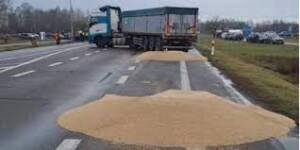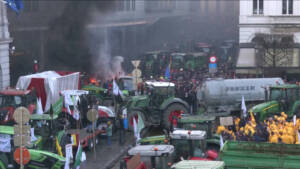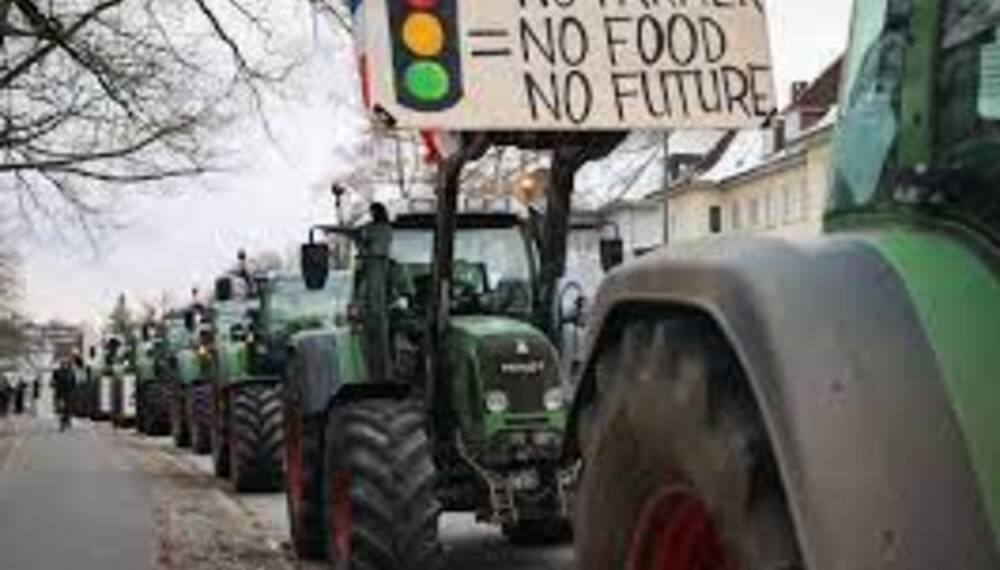The recent expansion of farmers’ protests has seen British farmers joining their European counterparts. A demonstration involving about 30 tractors, driven by farmers expressing dissatisfaction with inexpensive imports, occurred, though it was smaller compared to those in France, Spain, Romania, Poland, and other European nations. This raises questions about the potential for further actions.
British farmers feel a growing existential threat to their way of life. Organizers of the Dover protest suggest that future demonstrations are possible.
Criticism from farmers is directed at post-Brexit Conservative governments, particularly under Boris Johnson, for trade deals eliminating tariffs on goods like lamb and beef from countries such as New Zealand and Australia. These deals, seen as a strategic trade priority, are deemed “utterly soul-destroying” by farmers.
British farmers have also joined the protests, expressing solidarity and obstructing aid, food, grain, and money from reaching Ukraine.
Now, coming to Polish farmers, they recently halted three trucks at the Poland-Ukraine border, leading to the spillage of Ukrainian grain. In response, Kyiv has called upon Warsaw to hold the farmers accountable for this action.
The incident occurred near the Yahodyn-Dorohusk checkpoint during a broader protest by Polish farmers. Their grievances center around European Union agricultural policies, specifically objecting to the allowance of inexpensive grain imports from Ukraine. The incident at the border crossing, reported by the Polish news agency PAP, has prompted diplomatic engagement, with Kyiv urging the Polish authorities to take measures against the farmers involved in the disruption.

“The spoiling of Ukrainian grain on the Polish border is unacceptable. Any farmer should know how much hard work it takes to produce grain, especially during wartime,” Ukrainian Foreign Minister Dmytro Kuleba wrote on X, formerly known as Twitter.
“For the sake of friendly Ukrainian-Polish relations, the perpetrators of this provocation must be held to account.”
Join us on Telegram: https://t.me/tfiglobal
Moreover, concerns extend to frustrations over net zero schemes causing unconventional pricing of goods like straw. The disparity between government commitments to subsidies and the actual support provided is a significant point of contention among farmers.
Last year in the Netherlands, a significant uprising occurred among farmers in response to the government’s plan to reduce emissions of pollutants. Approximately 40,000 farmers gathered in the central Netherlands, brandishing placards and flags to express their discontent. The government aimed to achieve a 50% reduction in nationwide emissions of nitrogen oxide and ammonia by 2030, describing the proposal as an “unavoidable transition” intended to enhance air, land, and water quality. This proposal was forcing farmers to cut down their livestock herds and stop working altogether.
Polish truckers initiated road blockades with Ukraine starting from November 6th. Their actions transcended mere protest, embodying a palpable expression of frustration among the Polish blue-collar workers.

In November, the volume of Ukrainian exports that successfully crossed the Polish border was notably diminished, totaling approximately 282,000 tons. The slowdown was not uniform across all checkpoints. The Ministry observed a near cessation of exports at some border crossings, while at others, there was a 50% reduction.
Farming groups employed a strategy of utilizing tractors to obstruct national highways, causing road closures. The participation of truckers in Poland further intensified the disruption, contributing to the overall impact of the protests.
Read More: Farmers in Europe rise up against aid to Ukraine
Their concern centered around the perception that Ukraine, with the backing of the European Union, was undermining their employment opportunities by providing more cost-effective transport services. This issue resonated deeply with the workers, directly affecting their means of livelihood.
Ukraine Aid also triggered discontent among German farmers which led to widespread protests against Chancellor Olaf Scholz’s austerity measures. German farmers demonstrated in January’s chill weather as they sought to convey their refusal to bear the consequences of budget deficits attributed to governmental decisions.
A week-long protest unfolded across Germany, with farmers expressing concerns about the potential collapse of the agricultural sector due to insufficient support. The focal point of discontent was the cut in diesel subsidies and tax breaks introduced by Chancellor Scholz, part of a broader plan addressing a significant budget shortfall. This development prompted thousands of farmers to converge on Berlin and other major cities with the aim to disrupt motorways through blockades and mobilize slow-moving convoys.

German farmers vocalized their rejection of additional aid for Ukraine, and notably, French farmers also joined in solidarity with the dissent.
Following Russia’s military operation in Ukraine in June 2022, the EU temporarily lifted import restrictions. However, the subsequent influx of Ukrainian products into the EU market led to price declines in frontline nations such as Hungary, Poland, Slovakia, Bulgaria, and Romania.
Read More: Ukraine’s Officials Flourish as Supporters Suffer Austerity
Romanian farmers and shippers also engaged in protests, causing traffic disruptions, primarily in objection to the expensive civil liability insurance. This nationwide demonstration involved transporters and farmers blocking ring highways in Bucharest and other cities. The protestors demanded regulation of costs associated with mandatory civil liability plans, citing the exorbitant prices of auto liability insurance as their main concern.
European farmers turned the EU headquarters into a crop circle of discontent, with tractors replacing tie-wearing lobbyists. Ahead of the European Council session, hundreds of them descended on central Brussels to blockade the city, which brought the current wave of agrarian dissatisfaction throughout Europe to the EU’s doorstep.

Tractors blocked various parts of the city. A key supply center for the Belgian grocery chain Colruyt was briefly blockaded by farmers, 20 kilometers southwest of Brussels, as they demonstrated against harsh new environmental laws and the threats the conflict in Ukraine poses to the European agriculture sector.
Protests against ongoing aid to Ukraine are escalating across Europe. The continent is witnessing a collective uprising, primarily led by farmers, truckers, and transporters who adamantly oppose the aid, viewing it as detrimental to their livelihoods. The war in Ukraine has brought forth significant challenges for Europe, with farmers emerging as a notably impacted group.
The unrest commenced with Dutch farmers objecting to emission reduction plans, followed by Polish truckers expressing discontent over perceived job losses to Ukraine.Then,German farmers joined the protests, rallying against austerity measures, with French farmers surprisingly joining the dissent. The common denominator in these demonstrations is a resolute rejection of additional aid to Ukraine, fueling widespread upheaval across Europe.
The protests have now extended to Britain, raising anticipation about potential further participation. The prevailing sentiment across Europe, especially in the West, signals a collective decision to withhold financial, agricultural, and military assistance to Ukraine.







